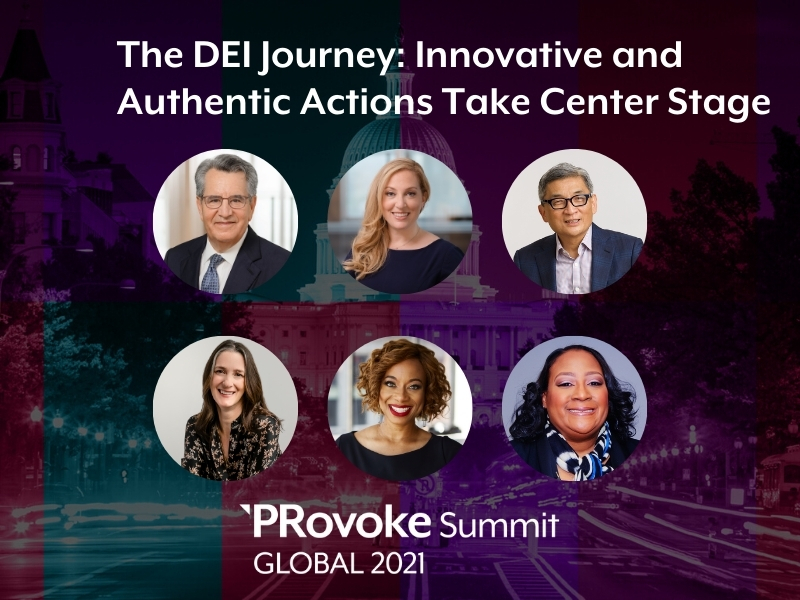Diana Marszalek 25 Oct 2021 // 8:15PM GMT

Boosting diversity and pay equity has a positive impact on PR agencies’ performances, new research shows.
A survey of 82 PR agencies from law firm Davis+Gilbert found that 2/3 of the firms that registered top profit performances this year have conducted pay equity audits. More than 40% of the firms with top revenue performances have increased BIPOC staff by at least 5%.
“Culture and compensation drive everything,” said Michael Lasky, founder and chair of D+G’s public relations practice group.
Lasky’s presentation of the findings kicked off a larger conversation on DEI Monday at PRovoke Media's 10th Global PR Summit. The conversation, part of the Summit’s Entrepreneurs’ Forum, included Egami founder and CEO Teneshia Jackson Warner; Finn Partners’ global chief diversity officer Helen Shelton; Inkhouse CEO Beth Monaghan; IW Group founder, chairman and chief connectivity officer Bill Imada; and D+G partner Jessica Cortes, who moderated the discussion.
The discussion covered a full range of topics around what it takes for PR agencies to create truly diverse and inclusive workplaces and help clients with their own internal and external initiatives, all against the backdrop of the racial and social complexities of our time.
For Egami, efforts have included writing and distributing a report on the impact of both racism and Covid on people of color, an effort Warner said “channeled the pain into purpose” after the murder of George Floyd.
“We strive to create cultures in which all of our team members feel they belong and can bring their whole selves to work, with everything it means to be a minority in the times we are living in. After the death of George Floyd, we cried together, we exhaled together, we were angry together,” she said.
The effort had impact, leading to Johnson & Johnson addressing health inequities by investing in underserved communities and P&G helping to close the technological divide by providing connected devices to 1 million students of color.
IW encourages clients to further their efforts to promote equity and justice, and does the same itself through financial and other support. “A lot of companies want to do something about racial injustice, but they go to safe places, donate a large sum of money and tick the box. We encourage clients to go to the Historically Black Colleges & Universities, if they really want to tackle injustice, and have uncomfortable conversations,” Imada said.
“If we’re going to reduce inequities in our country we have to put skin in the game. Not only our own intellectual capital but our own capital. And people power.”
Finn Partners supports minority owned businesses in its markets, is working with the Fragrance Foundation to make the fragrance industry more inclusive, and has launched employee groups based on personal interests as a means of bringing people from different backgrounds together around shared hobbies and the like.
At Inkhouse, fostering inclusivity has included community building, which has included publishing a book of employees’ personal essays, and holding listening sessions.
“To do DE&I well requires a lot more listening and less making assumptions. People may believe they are inclusive and liberal, but that can blind us from seeing the challenges,” Monaghan said. “We have to be willing to admit what we don’t know; willing to admit we’ve made mistakes; and we also have to be willing to hear everyone’s unique stories because no one is the same.”
It also requires educating clients. In some cases, that means helping them understand the needs and means to reach diverse audiences such as Black business owners, whose needs are different than Whites because they don’t get equal financial and other support. In others, though, it means educating clients in what America today looks like.
“We are really excited to pioneer and continue to lead the way in supporting our clients in what does it mean to market to the new mass market,” Warner said. “That is going to take significant cultural competence training and having the right solutions in our industry to make sure that marketing is multicultural marketing.”
Shelton, however, said communicators run the risk of having such efforts backfire if they are not backed up with the knowledge and desire necessary to make them a success.
“Messaging failures exist because people don’t educate themselves and they are not authentic. The one thing we can all do is understand the market, understand the consumer, and be authentic.”
“It is the one thing that will save all of us,” she said.



































.jpg)


















